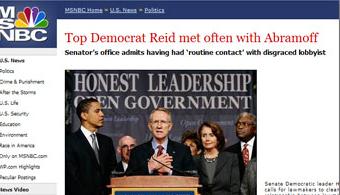This article was re-printed by the left-leaning US Airforce AIM Points. My question is this: What's the deal with these "supplemental funding requests," which allow Bush's budgets to look slightly less horrific than they actually are? Is their widespread use a Bush innovation, or does this go back to Johnson? Anyone know? BY: James Glanz, New York Times, 02/09/2006WASHINGTON, Feb. 8 — Virtually every measure of the performance of Iraq's oil, electricity, water and sewerage sectors has fallen below preinvasion values even though $16 billion of American taxpayer money has already been disbursed in the Iraq reconstruction program, several government witnesses said at a Senate Foreign Relations Committee hearing on Wednesday.
Of seven measures of public services performance presented at the committee hearing by the inspector general's office, only one was above preinvasion values.
Those that had slumped below those values were electrical generation capacity, hours of power available in a day in Baghdad, oil and heating oil production and the numbers of Iraqis with drinkable water and sewage service.
Only the hours of power available to Iraqis outside Baghdad had increased over prewar values.
In addition, two of the witnesses said they believed that an earlier estimate by the World Bank that $56 billion would be needed for rebuilding over the next several years was too low.
At the same time, as Iraq's oil exports plummet and the country remains saddled with tens of billions of dollars of debt, it is unclear where that money will come from, said one of the witnesses, Joseph A. Christoff, director of international affairs and trade at the Government Accountability Office.
And those may not be the most serious problems facing Iraq's pipelines, storage tanks, power lines, electrical switching stations and other structures, said Stuart W. Bowen Jr., the special inspector general for Iraq reconstruction, an independent office.
In one sense, focusing on the plummeting performance numbers "misses the point," Mr. Bowen said. The real question, he said, is whether the Iraqi security forces will ever be able to protect the infrastructure from insurgent attack.
"What's happened is that an incessant, an insidious insurgency has repeatedly attacked the key infrastructure targets, reducing outputs," Mr. Bowen said. He added that some of the performance numbers had fluctuated above prewar values in the past, only to fall again under the pressure of insurgent attacks and other factors.
The chairman of the committee, Senator Richard G. Lugar, Republican of Indiana, began by billing the session as a way of deciphering how much of America's original ambitions in the rebuilding program are likely to be fulfilled with the amount of money that Iraq, the United States Congress and international donors are still prepared to spend on the task.
This downsizing of expectations was striking given that $30 billion American taxpayer money has already been dedicated to the task, according to an analysis by Mr. Christoff of the accountability office. Of that money, $23 billion has already been obligated to specific rebuilding contracts, and $16 billion of that amount has been disbursed, Mr. Christoff said.
Mr. Bowen's office has pointed out that another $40 billion in Iraqi oil money and seized assets of Saddam Hussein's regime was also made available for reconstruction and other tasks at one time or another. Last week, Robert J. Stein Jr., one of four former United States government officials in Iraq who have been arrested in a bribery and kickback scheme involving that money, pleaded guilty to federal charges.
Mr. Bowen pointed out in his testimony that the news on reconstruction in Iraq is not all bad. Despite the recent financing and performance shortfalls, the rebuilding program now seems to be much less ridden by fraud, corruption and chaos than it was in the early days when people like Mr. Stein were in charge.
James R. Kunder, assistant administrator for Asia and the Near East at the United States Agency for International Development, in the State Department, emphasized things like what he called a 30 percent "potential increase" in electricity output because of new and reconditioned power generators in Iraq.
"We have done a lot of reconstruction work in Iraq over the last couple of years," Mr. Kunder said. "We did not meet all of the goals, the ambitious goals, we originally intended," he conceded.
Mr. Christoff of the accounting office said the latest numbers may actually overstate how well Iraqis have been served by the reconstruction program.
Water numbers, for example, often focus on how much drinkable water is generated at central plants, he said. But he said 65 percent of that water was subject to leaking from porous distribution pipes, which often run next to sewage facilities.
"So we really don't know how many households get potable, drinkable water," Mr. Christoff said.
Mr. Christoff also brought another new figure to the hearing: he said that on a recent trip to Baghdad, the American forces there had told him that they would need another $3.9 billion to continue training and equipping Iraqi forces, in part so that they can better protect the infrastructure.
The money would presumably be included in a 2006 supplemental funding request in which the Bush administration has said it would ask for more money to support the conflicts in Iraq and Afghanistan, an official at the Office of Management and Budget said. The administration "told us it would include this type of expenses," the official said, adding that no total for Iraqi security forces has yet come directly from the White House.
If the $3.9 billion that the American forces believe they need is actually appropriated, it would bring the total amount spent simply on training and equipping the Iraqi Army and the police to about $15 billion.


 Our special lady Starla got our demo tape to the manager at KZUG and as a result "Can I Borrow a Feeling?" went to #1. Curry fries and Brocolli taste extra good when purchased with a $50 gift certicate. (A much better picture of the album cover can be found here.)
Our special lady Starla got our demo tape to the manager at KZUG and as a result "Can I Borrow a Feeling?" went to #1. Curry fries and Brocolli taste extra good when purchased with a $50 gift certicate. (A much better picture of the album cover can be found here.)














